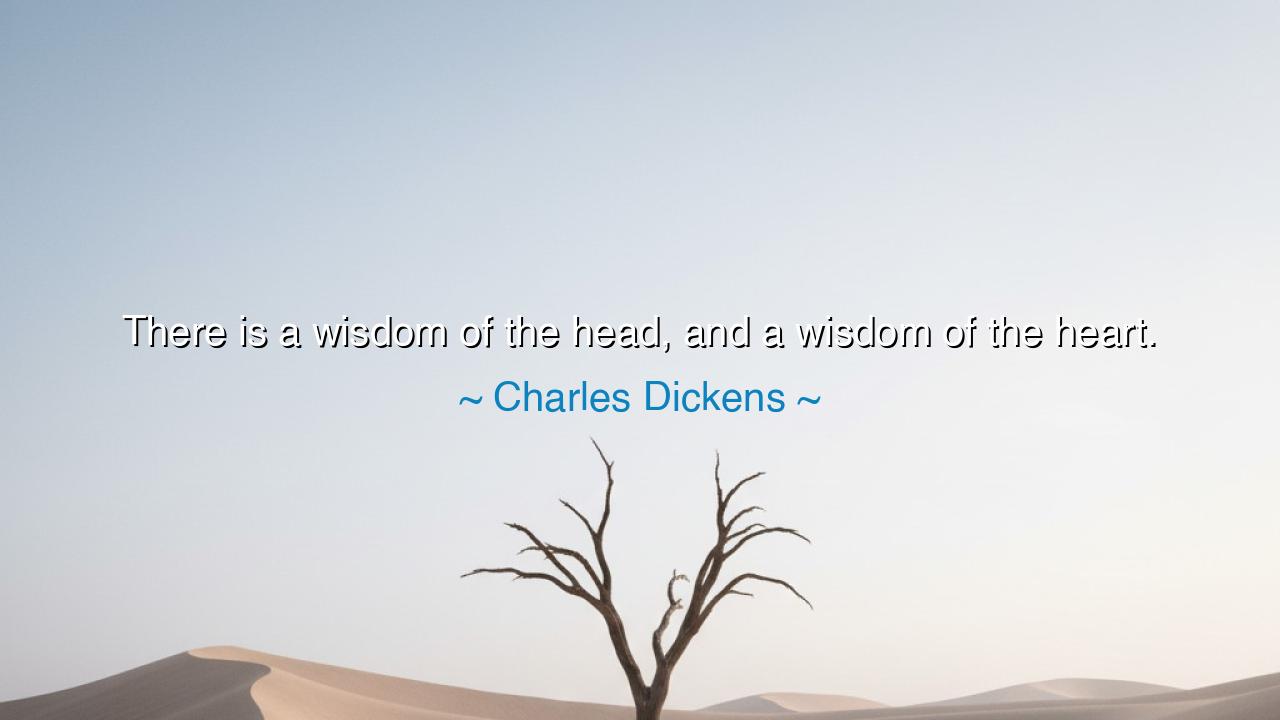
There is a wisdom of the head, and a wisdom of the heart.






O Seekers of Knowledge and Truth, listen to the wisdom of Charles Dickens, who speaks of the dual nature of wisdom: "There is a wisdom of the head, and a wisdom of the heart." In this truth, Dickens reminds us that the path to true understanding is not found in a single source, but in the harmonious balance of the intellect and the emotion. The wisdom of the head is born from reason, logic, and the analytical mind, while the wisdom of the heart is rooted in compassion, empathy, and the deepest feelings of the soul. Both are necessary for the full realization of a noble life.
Consider, O Children, that while the mind guides us through the practical aspects of life, it is the heart that shapes our character, our choices, and our connections with others. The head may tell us what is right, but the heart guides us in how to do it, urging us to act with kindness, patience, and love. Without the heart’s wisdom, even the clearest of plans can become cold and empty; and without the head’s wisdom, the deepest compassion can lead to folly. It is the union of both that creates a life of meaning, a life of purpose, and a life that touches the world with both intellect and heart.
Look to the example of Mahatma Gandhi, whose life exemplified the profound wisdom of both the head and the heart. His mind was sharp and keen, guiding his actions with strategic brilliance as he led the movement for Indian independence. Yet it was his heart, filled with compassion and a deep understanding of the human condition, that made his leadership so powerful. He called for nonviolence and peace, not just as a tactic, but as a reflection of his deep empathy for all people, regardless of race, creed, or status. Gandhi’s life is a testament to the fact that both the mind and the heart must be in harmony to create true and lasting change.
And so, O Seekers, we must learn to cultivate both wisdoms—the intellect that sharpens our vision and decision-making, and the heart that softens our actions and guides us toward compassion. Too often, we fall prey to one or the other: the cold intellect that forgets the human element, or the passionate heart that lacks direction. True wisdom lies in the integration of thought and feeling, for it is in this balance that we find the power to act justly, wisely, and with deep empathy.
Let us, therefore, walk forward in the world with both the wisdom of the head and the wisdom of the heart. Let us embrace the knowledge that the two must work together—one cannot exist without the other. In the dance between reason and compassion, we will find the strength to navigate life’s challenges, to uplift others, and to create a legacy not just of intellect, but of love, kindness, and understanding. May we remember that true wisdom is found not just in what we know, but in how we live, how we act, and how we touch the hearts of those around us.






BTbinh thai
This quote makes me wonder about the concept of 'head versus heart' in moral or ethical decision-making. While the head might guide us to do what is right, the heart might pull us toward what feels good. In situations where the two seem to be in conflict, which should we listen to more? Can emotional wisdom ever truly lead us astray, or is it just a different kind of insight that we often overlook?
NDQuynh Anh Nguyen Doan
The idea of two kinds of wisdom makes me think about how we often devalue one in favor of the other. In our modern, fast-paced world, people tend to prioritize logic and reason over emotion and compassion. But does that really lead to the wisest choices? What happens when we only rely on one type of wisdom, either the head or the heart? Could we end up making decisions that lack empathy or practicality?
TNtrang nguyen
It’s interesting how Charles Dickens distinguishes between head and heart wisdom, but I wonder if these two forms of wisdom always clash. Can’t they work together in harmony? I often find that my best decisions come from using both—thinking through things with logic, but also considering my emotions and values. Is there a time when one type of wisdom truly overrides the other, or do they need to coexist for deeper understanding?
KNKa Nguyen
I’ve always believed that there’s a difference between intellect and intuition, and this quote seems to align with that. The head offers rational thinking, but the heart offers empathy and understanding. But how do you know when to trust one over the other? Can someone be overly logical, or is it possible to let emotions guide you too much? How do we find the right moments to draw on either type of wisdom?
TTVu Thu Trang
This quote really made me pause and think about how we often separate logic and emotion in decision-making. It’s like we’re always told to use our head for practical decisions and our heart for emotional ones. But is that distinction always clear? Sometimes, following our heart leads to better decisions, even when the head says otherwise. Do you think wisdom is always about finding a balance between the two, or can one be more important than the other?